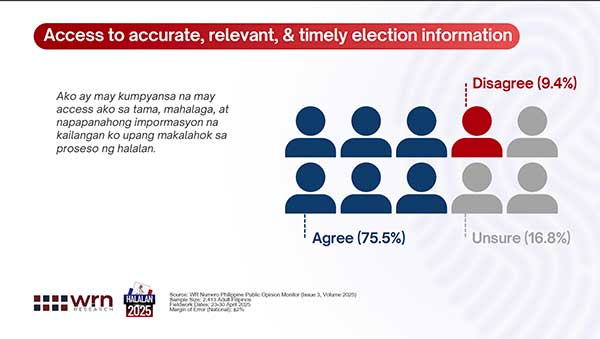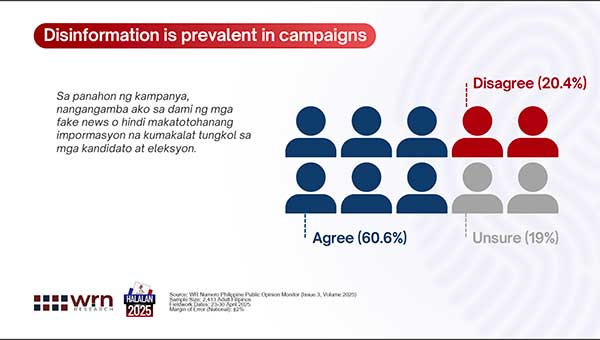By Joseph Bernard A. Marzan
The latest edition of the Philippine Public Opinion Monitor (PPOM), which was published on Tuesday, May 6, indicated that disinformation and access to information are important to likely voters.
The PPOM, which was conducted between April 23 and 30, indicated that 75.5 percent expressed confidence that they had access to accurate, relevant, and timely information, while 9.4 percent disagreed and 16.8 percent were unsure.
However, 60.6 percent expressed concern over false information spreading about the candidates and the election, while 20.4 percent disagreed and 19 percent were unsure.
Cleve Arguelles, president and CEO of WR Numero, which produces the PPOM, said that this was a worrying observation among voters.
“Even though most Filipinos would say that they have access to information that they need to participate in the electoral process, a lot of them are also aware that disinformation is prevalent in campaigns,” Arguelles said.
Arguelles stated that high public awareness of disinformation during election time was a positive step, while both the public and private sectors are having discussions on how to combat it.
“It’s very clear for ordinary voters that during election time, [disinformation] is a big problem. They themselves are acknowledging that, ‘Oh, the information that I might be consuming might be disinformative because I see it everywhere,’” he said.
“There’s probably popular support for an intervention on this. Comelec is trying to do something. I know that there are conversations in both houses of Congress. There are also conversations on the part of civil society. But we have yet to find a workable solution that might address this,” he added.
WR Numero’s founder and chairperson, Robin Michael Garcia, pointed out, however, that this did not mean that the public would not be vulnerable to being disinformed.
“Even the people who are aware are vulnerable to disinformation because we’re human beings. There are cognitive biases. For example, shortcuts that we use when we make decisions—the availability bias especially is important. The algorithm, specifically in Facebook, really pushes people to base their decisions on what’s more available to them,” Garcia said.
Political science professor Julio Teehankee cited a “push and pull” perspective—specifically, a push by the social media algorithm and by the conscious activity of troll farms and fake news peddlers.
The pull factor, however, is the phenomenon of low-information voters, which Teehankee says are also present globally.
“These are people who actually would vote but would have very low information about the issues involved. The tendency for some, especially for populist candidates, is to cultivate this,” Teehankee said.
“In the past, the playbook was you try to consolidate your base and try to attract as many independent voters as possible. But now, the game has changed with Trump, with Duterte, and so many. Now, it’s to cater to your base, curse out, say what needs to be believed, but at the same time, it will increase the algorithm and will attract low-information voters,” he added.























